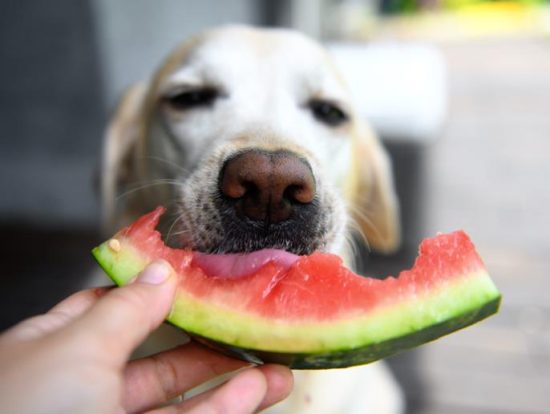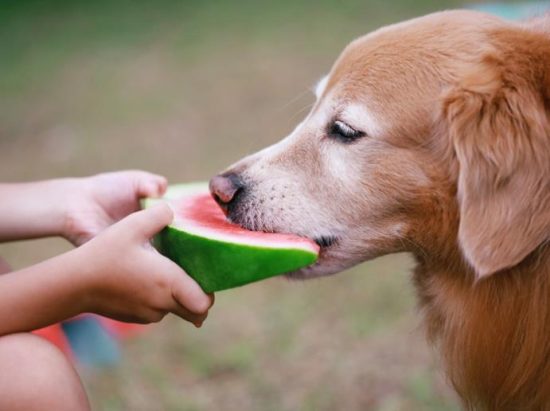Can Dogs Eat Watermelon? A Refreshing Treat for Your Pup
Discover if your furry friend can enjoy the juicy goodness of watermelon. Get the scoop on this sweet treat’s safety for dogs!

Watermelon is a beloved summer fruit that brings a refreshing burst of sweetness on hot days. But have you ever wondered if dogs can join in on the watermelon fun? Can dogs safely indulge in this juicy treat?
So, let’s dive into the world of watermelon and find out if this delicious fruit can be a refreshing treat for your dog.
Understanding Watermelon’s Nutritional Profile for Dogs
Watermelon is not only a tasty treat for humans, but it also offers a range of health benefits for dogs. As a dog owner, it’s important to understand the nutritional profile of watermelon and how it can contribute to your dog’s overall well-being.
One of the key advantages of including watermelon in your dog’s diet is its high water content. Just like humans, dogs need to stay hydrated, especially during hot weather or physical activity. By feeding your dog watermelon, you can help them stay refreshed and hydrated. The juicy and hydrating nature of watermelon makes it an excellent choice to combat dehydration in dogs.
Key Vitamins and Minerals in Watermelon
In addition to being hydrating, watermelon is rich in important vitamins and minerals that contribute to your dog’s overall health. It contains essential nutrients such as:
- Vitamin A, which promotes eye health and supports a strong immune system.
- Vitamin C, an antioxidant that helps boost the immune system and protect against cellular damage.
- Potassium, which is crucial for nerve and muscle function, including a healthy heart.
These vitamins and minerals are essential for your dog’s well-being and can help support their immune system, promote healthy digestion, and contribute to overall vitality.
| Nutrient | Amount per 100g |
|---|---|
| Vitamin A | 569 IU |
| Vitamin C | 8.1 mg |
| Potassium | 112 mg |
The table above provides the approximate amounts of these key nutrients found in 100 grams of watermelon. These values can vary based on the ripeness and variety of the fruit.
Is Watermelon Safe for Dogs to Eat? Uncovering the Facts
While watermelon can be a refreshing and nutritious treat for dogs, it’s essential to be aware of the potential risks and situations when it might not be suitable for them. In this section, we will delve into the safety considerations of feeding watermelon to dogs and explore the potential risks associated with consuming watermelon seeds and rind. By understanding these facts, you can make well-informed decisions regarding the inclusion of watermelon in your dog’s diet.
Watermelon seeds and rind pose potential risks for dogs when consumed in large quantities. The seeds can cause gastrointestinal blockages or obstructions, leading to discomfort, vomiting, or even more severe health issues. Additionally, the rind is challenging for dogs to digest and can result in digestive upset. Therefore, it is crucial to remove seeds and rind before offering watermelon to your furry friend.
When Watermelon Might Not be Suitable for Your Dog
Although watermelon is generally safe for dogs, some situations warrant caution or avoidance. If your dog has a sensitive stomach or a history of digestive issues, it may be best to avoid feeding them watermelon. Furthermore, if your dog has any known allergies or sensitivities to fruits, it is essential to consult with your veterinarian before introducing watermelon into their diet. Additionally, dogs with certain medical conditions, such as diabetes or kidney disease, may need to limit or avoid watermelon due to its sugar and potassium content. Always consult with your veterinarian to determine the suitability of watermelon for your individual dog.
| Risks of Watermelon for Dogs | Situations to Exercise Caution |
|---|---|
| • Ingestion of seeds can cause gastrointestinal blockages
• Rind is difficult to digest and can lead to digestive upset |
• Dogs with a sensitive stomach or digestive issues
• Dogs with known fruit allergies or sensitivities • Dogs with diabetes or kidney disease |
Preparation and Serving Suggestions for Watermelon
Now that we know watermelon can be a safe and nutritious treat for dogs, it’s important to understand how to properly prepare and serve it to them. Follow these step-by-step instructions to ensure your dog can enjoy this refreshing treat without any risks:
- Start by choosing a ripe watermelon that is sweet and juicy. Look for a firm and symmetrical fruit, with a deep color and a hollow sound when tapped.
- Wash the watermelon thoroughly to remove any dirt or pesticides that may be present on the rind.
- Cut the watermelon into bite-sized pieces that are suitable for your dog’s size. Remove the rind and seeds, as they can pose a choking hazard and may cause digestive issues.
- Serve the prepared watermelon pieces in a clean bowl or on a dog-friendly plate. You can also preserve the freshness by refrigerating the watermelon pieces before serving them.
- Observe your dog while they eat the watermelon to ensure they are chewing it properly and not experiencing any difficulties.
Can Dogs Eat Watermelon?
Many dog owners have concerns about feeding watermelon to their pets, especially when it comes to the presence of seeds. In this section, we will delve into the seedless debate and explore whether seedless watermelon is a safer option for dogs. We will also provide guidance on how to handle watermelon seeds if you opt for a seeded variety.
Seedless watermelon for dogs is a popular choice among pet owners who want to avoid the potential risks associated with seeds. Seedless watermelons are bred to have minimal or no seeds, making them easier to consume and reducing the chances of any discomfort or digestive issues for your furry friend.
However, the debate about watermelon seeds for dogs is not entirely settled. While some experts believe that small amounts of watermelon seeds are harmless and can even provide roughage and fiber, others caution against their ingestion. The main concern is that seeds can pose a choking hazard or cause intestinal blockages, especially in smaller dogs.
If you choose to feed your dog a seeded watermelon, it’s important to take precautions. Be sure to remove the seeds before offering the fruit to your pet. You can do this by cutting the watermelon into small, bite-sized pieces and carefully scooping out the seeds with a spoon or knife.

It’s also essential to monitor your dog while they eat watermelon to ensure they don’t accidentally swallow any seeds. While a few seeds may not cause significant harm, it’s best to err on the side of caution and remove as many seeds as possible.
The choice between seedless or seeded watermelon ultimately depends on your comfort level and your dog’s individual needs. If you’re concerned about the potential risks of seeds, seedless watermelon for dogs can be a safer option. However, if you decide to serve your dog a seeded watermelon, remember to remove the seeds diligently to minimize any potential hazards.
| Option | Advantages | Considerations |
|---|---|---|
| Seedless watermelon | Easier to eat and digest | May be more expensive or harder to find |
| Seeded watermelon | Provides natural roughage and fiber | Requires careful seed removal to avoid potential risks |
Avoiding Digestive Issues: Can Watermelon Upset a Dog’s Stomach?
While watermelon is generally safe for dogs to eat, some dogs may experience digestive issues after consuming it. It’s important to be aware of the signs of gastrointestinal distress that may indicate a negative reaction to watermelon. By paying attention to your dog’s behavior and taking prompt action, you can ensure their well-being and prevent further discomfort.
Signs of Watermelon-Induced Gastrointestinal Distress
If your dog experiences digestive issues from watermelon, you may observe the following signs:
- Upset stomach: Your dog may show signs of nausea, such as drooling, excessive licking, or swallowing.
- Vomiting: Your dog may vomit after consuming watermelon, which can be a sign of gastrointestinal distress.
- Diarrhea: Loose or watery stools may indicate that your dog’s digestive system is having difficulty processing the watermelon.
- Abdominal discomfort: Your dog may display signs of discomfort, such as whining, pacing, or a tense abdomen.
What to Do If Your Dog Overindulges in Watermelon?
If your dog overindulges in watermelon and experiences digestive discomfort, here are some steps you can take:
- Monitor your dog: Keep a close eye on your dog’s symptoms and behavior. If the symptoms are mild and subside on their own, you may not need to take any further action.
- Limit watermelon consumption: Reduce or temporarily eliminate watermelon from your dog’s diet to allow their digestive system to recover.
- Provide small, bland meals: Offer easily digestible foods, such as boiled rice or plain boiled chicken, to help soothe your dog’s stomach.
- Offer plenty of water: Ensure your dog stays hydrated by providing fresh water for them to drink.
- Contact your veterinarian: If your dog’s symptoms worsen, persist for an extended period, or if you have any concerns, it’s essential to consult with your veterinarian for appropriate guidance and advice.
Quantity Matters: How Much Watermelon Can I Give My Dog?
When it comes to feeding watermelon to your dog, portion control is crucial to ensure their health and well-being. While watermelon can be a refreshing treat, it should be given in moderation to maintain a balanced diet. So, how much watermelon is safe for dogs to consume?
The amount of watermelon you can give to your dog depends on their size and weight. As a general guideline, it’s recommended to offer watermelon in small portions to prevent any digestive issues.
For small dog breeds, such as Chihuahuas or Shih Tzus, start with a few small cubes of watermelon as a snack. Larger dog breeds, like Labrador Retrievers or German Shepherds, can be given slightly larger portions. Remember that watermelon should only supplement your dog’s regular diet and should not exceed more than 10% of their daily caloric intake.
It’s important to note that watermelon should not replace their regular meals or be the main source of nutrition. Consult with your veterinarian to determine the appropriate portion size based on your dog’s specific needs and dietary requirements.
In addition to portion control, be mindful of any other ingredients or additives in the watermelon. Plain, freshly diced watermelon is best for dogs, without any seasonings, sugars, or other fruits that could be harmful to them.
The Sweet Side of Caution: Watermelon’s Sugar Content and Your Dog
While watermelon is a sweet and tempting treat for your dog, it’s essential to understand the sugar content and the associated risks with excessive sugar intake. Just like humans, dogs can experience negative health effects from consuming too much sugar, including obesity, dental issues, and an increased risk of developing diabetes.
Dogs are naturally attracted to sweet flavors, making it important to monitor their sugar intake. Consuming excessive amounts of sugar can lead to weight gain and obesity, as well as contribute to dental problems such as tooth decay and gum disease. Moreover, dogs that consume high levels of sugar regularly may be at a higher risk of developing diabetes, which can have serious health implications.
Watermelon Alternatives: Which Fruit Can a Dog Eat?

If your dog has dietary restrictions or if you’re looking for alternative fruits to add variety to their diet, there are several dog-friendly fruits to consider. While watermelon is a delicious and hydrating option, it’s always good to provide your furry friend with other healthy choices.
Here are some dog-friendly fruits that can serve as alternatives to watermelon:
- Apples: Apples are a great source of vitamins and fiber for dogs. Just make sure to remove the core and seeds before serving.
- Berries: Blueberries, strawberries, and raspberries are packed with antioxidants and can be given to dogs in moderation for a tasty treat.
- Bananas: Bananas are rich in potassium and can be mashed or sliced for a sweet and nutritious snack.
- Pineapple: Pineapple is loaded with vitamins and enzymes that can aid digestion in dogs, but be sure to remove the tough outer skin and core.
- Cantaloupe: This juicy melon is a refreshing option for dogs, providing hydration and essential vitamins.
Hydration through Fruits: Why Do Dogs Love Watermelon?
Dogs are naturally drawn to watermelon, and there are specific reasons why they love this juicy fruit. One of the factors that make watermelon appealing to dogs is its texture. The crisp and watery nature of watermelon provides a satisfying crunch that can be enjoyable for dogs to chew on. Additionally, watermelon has a naturally sweet flavor that appeals to a dog’s taste buds, making it a delightful treat.
But it’s not just about taste and texture. Watermelon offers unique hydration benefits for dogs. As mentioned earlier, watermelon is mostly made up of water, making it an excellent hydration source, especially during hot summer months. The hydration benefits of watermelon for dogs can help to keep them cool, refreshed, and adequately hydrated.
Comparing watermelon to other hydration methods for dogs, it stands out as a natural and healthy option. Watermelon is a refreshing and nutritious choice unlike sugary drinks or processed snacks. It provides essential vitamins and minerals, such as vitamin A and vitamin C, that contribute to a dog’s overall well-being. When it comes to comparing watermelon to other hydration methods, watermelon offers a natural and wholesome alternative that can be both beneficial and enjoyable for dogs.
Now that we understand why dogs love watermelon and its unique hydration benefits let’s explore some fun and creative ways to incorporate watermelon into your dog’s diet. We’ll share exciting recipes and treat ideas that will make watermelon an even more delightful and refreshing experience for your furry friend.
Fun Watermelon-Based Treat Ideas for Your Pup
Watermelon is not only a tasty and refreshing treat for dogs, but it can also be a versatile ingredient in creating fun and delicious snacks. In this section, we will share some creative ideas for using watermelon to make frozen treats that will keep your pup cool and satisfied.
Creating Frozen Watermelon Treats

If you’re looking for a simple way to incorporate watermelon into your dog’s treat routine, consider making frozen watermelon treats. These treats are easy to make and can provide a refreshing and hydrating snack for your furry friend.
To create frozen watermelon treats, start by cutting a ripe watermelon into small, bite-sized pieces. Remove any seeds and rind from the watermelon before freezing. Place the watermelon pieces on a baking sheet lined with parchment paper and place in the freezer until they are completely frozen.
Once the watermelon pieces are frozen, you can serve them as a standalone treat or mix them with other dog-friendly ingredients such as plain yogurt or peanut butter. You can also use silicone molds or ice cube trays to create fun shapes and sizes for your pup to enjoy.
Watermelon-Infused Pupcakes and Other Recipes
If you’re feeling a bit more adventurous in the kitchen, you can try making watermelon-infused pupcakes and other dog-friendly recipes. These recipes can be a special way to celebrate your pup’s birthday or other special occasions.
To make watermelon-infused pupcakes, start by pureeing a small amount of watermelon in a blender or food processor until smooth. In a separate bowl, combine flour, baking powder, and an egg. Gradually add the watermelon puree to the dry ingredients and mix until well combined.
Next, spoon the batter into cupcake liners and bake in a preheated oven according to the recipe instructions. Once the pupcakes are cooled, you can frost them with a dog-friendly icing made from mashed bananas and a touch of honey.
In addition to pupcakes, you can also try other watermelon-infused recipes such as watermelon popsicles, watermelon and chicken jerky, or even watermelon and cheese bites. These recipes can provide a variety of flavors and textures for your pup to enjoy.
When preparing these recipes, it’s important to remember that watermelon should be used in moderation and supplemented with a balanced diet. Always consult with your veterinarian before introducing any new foods or treats into your dog’s diet to ensure they are safe and suitable for your individual pet.
FAQs on can dog eat watermelon
What are the nutritional benefits of watermelon for dogs?
Watermelon is hydrating and contains essential vitamins and minerals, such as vitamin A, vitamin C, and potassium, which can contribute to a dog’s overall health and well-being.
Is it safe for dogs to consume watermelon seeds and rind?
Watermelon seeds and rind can pose choking hazards and may cause digestive issues in dogs. It is best to remove seeds and rind before feeding watermelon to your dog.
Are there any situations when watermelon might not be suitable for dogs?
Yes, certain situations, such as dogs with specific health conditions or dietary restrictions, may require avoiding watermelon. Consult with your veterinarian before introducing any new foods into your dog’s diet.
How should I prepare and serve watermelon to my dog?
Remove seeds and rind and cut watermelon into bite-sized pieces before serving it to your dog. It is important to ensure that the watermelon is fresh and free from any additives or seasonings.
Is seedless watermelon a safer option for dogs?
Seedless watermelon can be a convenient and safer option, as it eliminates the risk of choking on seeds. However, it is still important to remove any remaining seeds before feeding it to your dog.
What are the signs of watermelon-induced gastrointestinal distress in dogs?
Signs of digestive issues may include vomiting, diarrhea, and stomach discomfort. If your dog experiences these symptoms after consuming watermelon, consult with your veterinarian.
How much watermelon can I give my dog?
Portion control is important. The amount of watermelon depends on your dog’s size and weight. Consult with your veterinarian to determine the appropriate portion size for your dog.
Are there any risks of excessive sugar intake from watermelon in dogs?
Watermelon contains natural sugars, so it is important to balance treat consumption with a healthy and balanced diet to avoid potential weight gain or other health issues.
What are some dog-friendly fruit alternatives to watermelon?
There are several dog-friendly fruits you can offer as alternatives to watermelon, such as apples, blueberries, and strawberries. Always remove any seeds or pits and introduce new fruits gradually.
Why do dogs love watermelon?
Dogs are naturally attracted to the texture and sweet flavor of watermelon. It is also a refreshing and hydrating fruit, making it an appealing choice for dogs.





